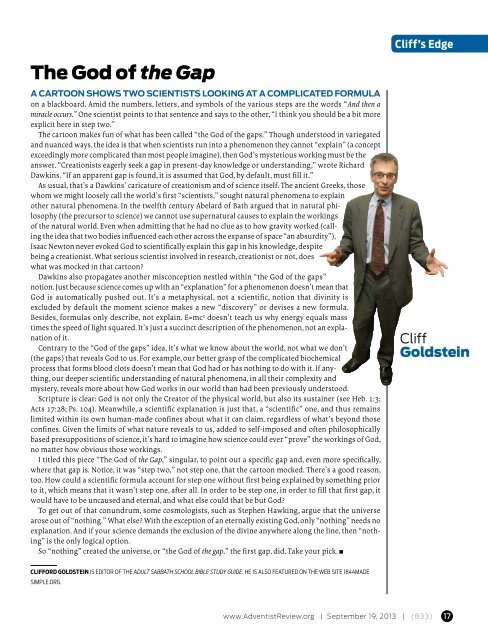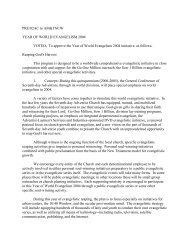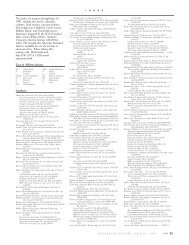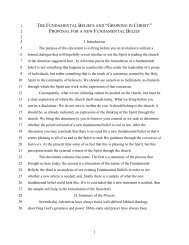Download PDF - Adventist Review
Download PDF - Adventist Review
Download PDF - Adventist Review
- No tags were found...
Create successful ePaper yourself
Turn your PDF publications into a flip-book with our unique Google optimized e-Paper software.
Cliff’s Edge<br />
The God of the Gap<br />
A cartoon shows two scientists looking at a complicated formula<br />
on a blackboard. Amid the numbers, letters, and symbols of the various steps are the words “And then a<br />
miracle occurs.” One scientist points to that sentence and says to the other, “I think you should be a bit more<br />
explicit here in step two.”<br />
The cartoon makes fun of what has been called “the God of the gaps.” Though understood in variegated<br />
and nuanced ways, the idea is that when scientists run into a phenomenon they cannot “explain” (a concept<br />
exceedingly more complicated than most people imagine), then God’s mysterious working must be the<br />
answer. “Creationists eagerly seek a gap in present-day knowledge or understanding,” wrote Richard<br />
Dawkins. “If an apparent gap is found, it is assumed that God, by default, must fill it.”<br />
As usual, that’s a Dawkins’ caricature of creationism and of science itself. The ancient Greeks, those<br />
whom we might loosely call the world’s first “scientists,” sought natural phenomena to explain<br />
other natural phenomena. In the twelfth century Abelard of Bath argued that in natural philosophy<br />
(the precursor to science) we cannot use supernatural causes to explain the workings<br />
of the natural world. Even when admitting that he had no clue as to how gravity worked (calling<br />
the idea that two bodies influenced each other across the expanse of space “an absurdity”),<br />
Isaac Newton never evoked God to scientifically explain this gap in his knowledge, despite<br />
being a creationist. What serious scientist involved in research, creationist or not, does<br />
what was mocked in that cartoon?<br />
Dawkins also propagates another misconception nestled within “the God of the gaps”<br />
notion. Just because science comes up with an “explanation” for a phenomenon doesn’t mean that<br />
God is automatically pushed out. It’s a metaphysical, not a scientific, notion that divinity is<br />
excluded by default the moment science makes a new “discovery” or devises a new formula.<br />
Besides, formulas only describe, not explain. E=mc 2 doesn’t teach us why energy equals mass<br />
times the speed of light squared. It’s just a succinct description of the phenomenon, not an explanation<br />
of it.<br />
Contrary to the “God of the gaps” idea, it’s what we know about the world, not what we don’t<br />
(the gaps) that reveals God to us. For example, our better grasp of the complicated biochemical<br />
process that forms blood clots doesn’t mean that God had or has nothing to do with it. If anything,<br />
our deeper scientific understanding of natural phenomena, in all their complexity and<br />
mystery, reveals more about how God works in our world than had been previously understood.<br />
Scripture is clear: God is not only the Creator of the physical world, but also its sustainer (see Heb. 1:3;<br />
Acts 17:28; Ps. 104). Meanwhile, a scientific explanation is just that, a “scientific” one, and thus remains<br />
limited within its own human-made confines about what it can claim, regardless of what’s beyond those<br />
confines. Given the limits of what nature reveals to us, added to self-imposed and often philosophically<br />
based presuppositions of science, it’s hard to imagine how science could ever “prove” the workings of God,<br />
no matter how obvious those workings.<br />
I titled this piece “The God of the Gap,” singular, to point out a specific gap and, even more specifically,<br />
where that gap is. Notice, it was “step two,” not step one, that the cartoon mocked. There’s a good reason,<br />
too. How could a scientific formula account for step one without first being explained by something prior<br />
to it, which means that it wasn’t step one, after all. In order to be step one, in order to fill that first gap, it<br />
would have to be uncaused and eternal, and what else could that be but God?<br />
To get out of that conundrum, some cosmologists, such as Stephen Hawking, argue that the universe<br />
arose out of “nothing.” What else? With the exception of an eternally existing God, only “nothing” needs no<br />
explanation. And if your science demands the exclusion of the divine anywhere along the line, then “nothing”<br />
is the only logical option.<br />
So “nothing” created the universe, or “the God of the gap,” the first gap, did. Take your pick. n<br />
Cliff<br />
Goldstein<br />
Clifford Goldstein is editor of the Adult Sabbath School Bible Study Guide. He is also featured on the Web site 1844made<br />
simple.org.<br />
www.<strong>Adventist</strong><strong>Review</strong>.org | September 19, 2013 | (833) 17
















